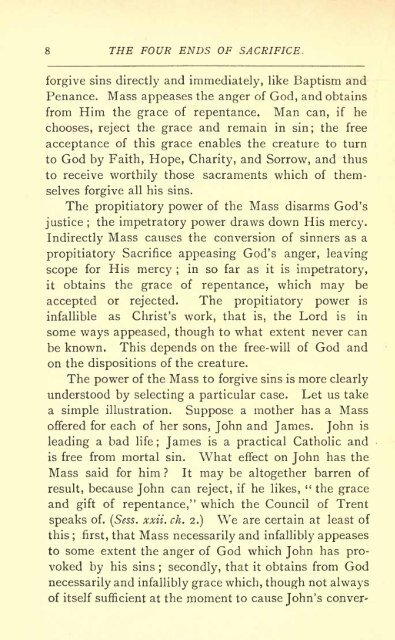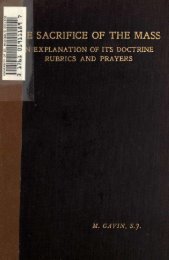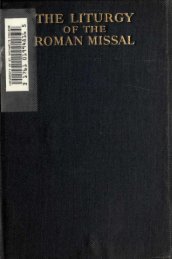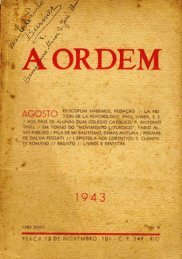E SACRIFICE OF THE MASS
E SACRIFICE OF THE MASS
E SACRIFICE OF THE MASS
Create successful ePaper yourself
Turn your PDF publications into a flip-book with our unique Google optimized e-Paper software.
<strong>THE</strong> FOUR ENDS <strong>OF</strong> <strong>SACRIFICE</strong>.<br />
forgive sins directly and immediately, like Baptism and<br />
Penance. Mass appeases the anger of God, and obtains<br />
from Him the grace of repentance. Man can,<br />
if he<br />
chooses, reject the grace and remain in sin; the free<br />
acceptance of this grace enables the creature to turn<br />
to God by Faith, Hope, Chanty, and Sorrow, and thus<br />
to receive worthily those sacraments which of them<br />
selves forgive all his sins.<br />
The propitiatory power of the Mass disarms God s<br />
justice ; the impetratory power draws down His mercy.<br />
Indirectly Mass causes the conversion of sinners as a<br />
propitiatory Sacrifice appeasing God s anger, leaving<br />
scope for His mercy ; in so far as it is impetratory,<br />
it obtains the grace of repentance, which may be<br />
accepted or rejected. The propitiatory power is<br />
infallible as Christ s work, that is, the Lord is in<br />
some ways appeased, though to what extent never can<br />
be known. This depends on the free-will of God and<br />
on the dispositions of the creature.<br />
The power of the Mass to forgive sins is more clearly<br />
understood by selecting a particular case. Let us take<br />
a simple illustration. Suppose a mother has a Mass<br />
offered for each of her sons, John and James. John is<br />
Catholic and<br />
leading a bad life ; James is a practical<br />
is free from mortal sin. What effect on John has the<br />
Mass said for him ? It may be altogether barren of<br />
result, because John can reject, if he likes,<br />
" the grace<br />
and gift of repentance," which the Council of Trent<br />
speaks of. (Sess. xxii. ch. 2.) We are certain at least of<br />
this ; first, that Mass necessarily and infallibly appeases<br />
to some extent the anger of God which John has pro<br />
voked by his sins ; secondly,<br />
that it obtains from God<br />
necessarily and infallibly grace which, though not always<br />
of itself sufficient at the moment to cause John s conver-






